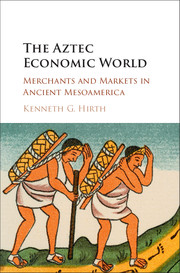Book contents
- Frontmatter
- Contents
- List of figures
- List of tables
- Preface
- Abbreviations
- 1 Introduction to the Aztec economic world
- 2 The structure of Mesoamerican economy
- 3 The Mesoamerican marketplace
- 4 Merchants, profit, and the precolumbian world
- 5 Often invisible: domestic entrepreneurs in Mesoamerican commerce
- 6 The professional retail merchants
- 7 Merchant communities and pochteca vanguard merchants
- 8 The tools of the trade and the mechanics of commerce
- 9 Conclusions
- Notes
- Glossary of Nahuatl and early colonial Spanish terms
- Bibliography
- Index
5 - Often invisible: domestic entrepreneurs in Mesoamerican commerce
Published online by Cambridge University Press: 05 May 2016
- Frontmatter
- Contents
- List of figures
- List of tables
- Preface
- Abbreviations
- 1 Introduction to the Aztec economic world
- 2 The structure of Mesoamerican economy
- 3 The Mesoamerican marketplace
- 4 Merchants, profit, and the precolumbian world
- 5 Often invisible: domestic entrepreneurs in Mesoamerican commerce
- 6 The professional retail merchants
- 7 Merchant communities and pochteca vanguard merchants
- 8 The tools of the trade and the mechanics of commerce
- 9 Conclusions
- Notes
- Glossary of Nahuatl and early colonial Spanish terms
- Bibliography
- Index
Summary
people who only eat black bread and drink water would like to eat wheaten bread and drink wine; people who never have eaten meat would like to do so; people with poor clothes would like better ones; people without wood to warm themselves by would like to buy it, and so on.
(François Quesnay on domestic consumption, 1766)It is taken for granted in most discussions of the ancient economy that non-elite domestic consumption played little to no role in stimulating trade and commerce at the regional and inter-regional levels. Instead, the stimulus for inter-regional trade often is credited to long-distance trade in high-value goods. The reasons for emphasizing the importance of wealth goods over staple goods are varied and include: the impoverished conditions of peasants in ancient society, the self-sufficient orientation of domestic production, the high cost and limited ability of transporting bulk commodities over space, and the lack of historic evidence for the domestic consumption of non-local products on any significant scale in premodern societies. Furthermore, low population densities in rural areas made it difficult for merchants to locate the demand for imported goods across the countryside. The result has been to discount the importance of the rural market and to focus on the sources of special, concentrated demand as the stimuli behind ancient commerce. These include the political and religious institutions, the nobility and their appetite for high-value goods, and, of course, urban communities which contained a mixture of demand from their nucleated population and their corresponding elite and institutional consumers.
If there ever was a place where this characterization should fit it is Mesoamerica. The agricultural technology was not complex by western standards, restricted to simple hand tools, and constrained by a transportation system where most goods moved on the backs of human porters. Furthermore, as discussed in Chapter 2, support for the institutional economy was based on labor service rather than a head tax or tax-in-kind on domestic production. This provided households with greater autonomy and reduced their need to sell goods to meet any type of annual tax obligation. Although these conditions fostered insularity, very few households in Mesoamerica were ever completely self-sufficient for all the domestic items used in everyday life.
- Type
- Chapter
- Information
- The Aztec Economic WorldMerchants and Markets in Ancient Mesoamerica, pp. 102 - 150Publisher: Cambridge University PressPrint publication year: 2016
- 1
- Cited by



